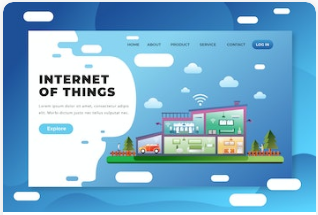The Internet of Things (IoT) has become a buzzword in recent years, promising to revolutionize the way we live and interact with our surroundings. From smart homes to intelligent industrial systems, IoT is propelling us towards a more interconnected and automated future. In this blog, we will dive into the fascinating world of IoT, exploring its definition, applications, and the potential impact it holds across various sectors.
What is IoT?
At its core, IoT refers to a network of physical objects embedded with sensors, software, and internet connectivity, allowing them to collect and exchange data. These objects, also known as “smart devices,” range from everyday items like thermostats, refrigerators, and wearable devices to complex industrial machinery, vehicles, and infrastructure.
The Power of Connectivity:
By enabling these objects to communicate with each other and with users, IoT creates an ecosystem of interconnected devices that can seamlessly share data and perform actions. This connectivity empowers us to automate processes, enhance decision-making, and augment our daily lives with a new level of convenience and efficiency.
Applications in Everyday Life:
The impact of IoT can be observed in various aspects of our daily lives. Smart homes equipped with intelligent devices such as thermostats, lighting systems, and security cameras offer unprecedented comfort and control. Imagine arriving home to a perfectly heated environment, with the lights and music automatically set to your preferences. Moreover, connected appliances provide real-time updates, making grocery shopping and meal planning a breeze.
IoT’s reach extends beyond the confines of our homes. In the healthcare sector, wearable devices and remote monitoring systems allow patients to track their vital signs and receive personalized healthcare without physically visiting a hospital. In transportation, IoT enables seamless communication between vehicles, allowing for smoother traffic flow and safer roads. Additionally, logistics companies leverage IoT to optimize routes, track shipments, and enhance supply chain management.
Transforming Industries:
IoT has even penetrated industrial sectors, giving rise to the concept of “smart factories.” By integrating sensors and connectivity into manufacturing processes, IoT empowers businesses to achieve higher levels of automation, real-time monitoring, and predictive maintenance. This ensures optimized production, reduced downtime, and improved resource management.
Challenges and Considerations:
While the potential of IoT is vast, it’s imperative to address the challenges it presents. Security and privacy concerns are paramount, as the vast amount of data generated by IoT devices can be vulnerable to cyber threats. It is crucial to implement robust security measures to protect user information and prevent unauthorized access.
Moreover, the ethical implications of data collection in IoT must be carefully managed. Striking a balance between data-driven insights and individual privacy is crucial for building trust and ensuring responsible usage of IoT technology.
The Internet of Things (IoT) is transforming how we interact with technology and the world around us. From revolutionizing our homes to optimizing industrial processes, the potential applications of IoT are limitless. However, as with any emerging technology, it is important to approach IoT with a critical lens to ensure its responsible and secure implementation. By doing so, we can unlock the full potential of a connected future and embrace the countless possibilities that IoT presents.
